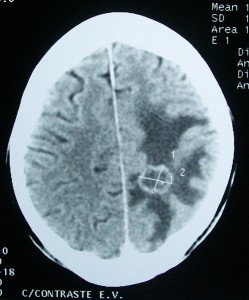Our bodies are mainly made up carbon, but second to that is water. Water is essential to staying alive. Not drinking enough water leads to dehydration, which in turn will lead to other undesirable things. One result of dehydration is a decline in cognitive performance. According to a 2012 article in the Journal of the American College of Nutrition, even mild dehydration (defined as a 1 to 2% decrease in water levels in the body) in young adults can lead to a decrease in the performance of tasks that require immediate attention like psychomotor skills and immediate memory. Fortunately, long-term memory and executive function (tasks that require planning and emotional control) all seem to be unaffected. For young children and the elderly, the risks involved with dehydration are even more serious.

Staying hydrated. Image source: Wikimedia Commons–Tomasz Sienicki
Since staying hydrated is important in maintaining normal body functions and good health, it may seem like a good idea to drink as much of it as you can. Unfortunately, that is not the case. While drinking water to stay hydrated is important in avoiding negative effects of dehydration, it is possible to have too much of a good thing. In early 2007, a California woman died of drinking too much water. She was competing in a radio station contest to win a Nintendo Wii, the contestant who drank the most water would be the winner. While she may have won a Wii, she lost her life.
This condition that she died of is called “hyponatremia” or in common words: her blood salt levels were too low. This means having salt concentration levels of less than 135 millimoles per litre of blood. When you drink too much water, the kidneys can no longer remove the excess water from the body fast enough. The bloodstream overflows with water which in turn dilutes the salt content. The water has no where else to go so it overflows into the surrounding cells. Most cells in the body are able to expand and swell to accommodate the incoming water.
Brain cells on the other hand, do not have such an ability. This is because brain cells are located in the skull (duh!) and share skull space with other things like cerebrospinal fluid and blood. The skulls is hard and does not expand. There is simply no more extra space for the brain cells to expand into. So when there is an excess of water entering the skull, the brain swells causing an edema. This brain swelling, or edema, leads to several problems like coma, seizures, damage to brain stem, and even death.

Cerebral edema surrounding brain tumor.
Image source: Wikimedia Commons.
Drinking water daily is important to maintaining good health, but too much may lead to poorer health outcomes. To keep within safe water intake levels, remember that the kidney (healthy and at rest) outputs 800 to 1,000 mL of water each hour. So it’s safe to consume this much water each hour.
Jade Lu

2 responses to “Are you drinking too much water?”